Numerous interested people were guests at the Mission 21 research archive on Thursday, May 11, 2023. Dr. Patrick Moser, archivist at Mission 21, showed Original documents from the Mission Trading Society's holdings. These range from the beginnings in India and on the Gold Coast, through the phase of separation of mission and trading company, to the UTC supermarkets in Nigeria and Ghana in the 1960s and the company's connections to Switzerland.
As a follow-up to the webinar of May 4, 2023 with Dr. Lea Haller on "Trade and Colonialism: the Basel Mission and the Mission Trading Society," Dr. Patrick Moser, archivist of Mission 21, presented originals from the holdings of the Basel Trading Society at the Mission House on Thursday May 11, 2023. This has been systematically processed in recent years and is available to researchers for research.
The documents range from the beginnings of economic activity of the Basel Mission in India and on the Gold Coast in what is now Ghana, and include records from the time of the separation of the trading company from the Basel Mission (1917) to the 1960s, when the former mission trading company had become a global trading group.
Jobs and trade
In the 1840s and 1850s, the Basel Mission began to set up weaving mills and brickworks in India to provide work and income for the members of the mission congregations who had converted to Christianity and thus become casteless. At the same time, she opened a grocery store on the Gold Coast, offering sugar, tea, coffee and rice, among other things.
The economic activities expanded more and more and finally led to the foundation of the "Missions-Handels-Gesellschaft" in 1859, one of the first stock corporations ever in Basel. In particular, the Burckhardt, Merian, Sarasin and Ryhiner families from Basel's upper class participated in the company and saw themselves as "ethical investors", since the profits from the business not only went to the shareholders, but also to a large extent to the Basel Mission.
The holdings of the trading company contain impressive lists and reports on the import and export of goods and "cash crops" such as palm oil or cocoa, which were transported between Europe and Africa by ship. In addition, the tension between market and mission is repeatedly visible in the protocols and letters. The Basel mission was clearly dependent on the business of the trading company. Its profits covered a quarter of the mission's expenses before the First World War.
Separation from the Basel Mission
The contradiction between the ethical principles of the mission and the simultaneous pressure of the trading company to generate returns for the mission's activities was repeatedly addressed and discussed at the event. It became apparent how the trading company became part of the increasing globalization in the 19th century until the outbreak of the First World War, constantly changing and evolving.
Little research has been done so far on the history of the trading company after World War I and its separation from the Basel Mission in 1917. This was a clear break in the history of the company and from then on both institutions went their own ways. With the help of the files, Patrick Moser was able to show how the company continued to expand and founded agency companies in London New York and Hamburg. It bought Western goods and sold African products. In doing so, it was part of purchasing cartels together with other companies. Increasingly, it also became active in Switzerland: The Basel trading company (the term "Mission" in its name was dropped in 1928) took a stake in the Hohlenstein textile printing company in Glarus, among other things, and for a time owned the Bischofszell canning factory before it was sold to the Migros cooperative.
The trading company diversified its business activities more and more, but as a result fell into a permanent crisis. In 2000 it was finally taken over by the investment company Welinvest. By presenting the documents from the holdings of the Basel Trading Company, Dr. Moser provided an interesting insight into the economic activities of the Basel Mission and its trading company. However, much remains to be researched, especially with regard to the history of the trading company after World War I and the separation from the Basel Mission in 1917.
With the research archive, Mission 21 enables a transparent reappraisal of its past, in particular the history of its predecessor organization, the Basel Mission, and thus offers a hand for a differentiated approach to the development of the mission.
Text: Séverine Fischer, Mission 21






